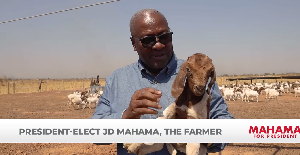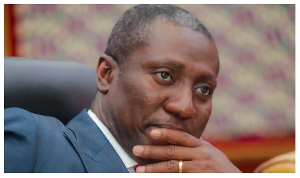The past two weeks have been exciting in the Ghana markets. A series of opposing activities interestingly have prevailed on the airwaves and in our newspapers. An opposition led and inspired ?Wahala? series of seemingly ineffective demonstrations are laboring to gain momentum as they also struggle to find a common cause for the demonstrations. On the other hand H.E President J.A. Kufuor is chalking significant credit and continues to carry Ghana higher on both domestic and international fronts with announcements of a 100% debt relief for Ghana on the back of the HIPC initiative adopted by the NPP government in 2001. Ghana?s choice of going HIPC was met with great criticism and opposition by the opposition NDC. Ghana has been cited as a good example and model developing country whose adoption of democratic rule, good governance, successful and positive socio-economic reforms has yielded good economic benefits. Other laudable efforts include private sector led economic growth strategies, the rule of law and efforts at combating corruption.
Current events in the domestic market are also pointing to the right direction. A recent release by the Monetary Policy Committee of the Central Bank has generated optimistic feelings in the banking and business sectors. The Bank of Ghana Prime Rate has been reduced from 18.5% to 16.5% on the back of subdued inflationary pressures, relative stability in the forex market, increased foreign reserves (and increased liquidity in the forex market) as well as stability in the money markets.
The drive to stability has not been by accident as has been recently demonstrated by the Governor of the Central Bank Dr Paul Acquah in a presentation last Tuesday. Primary reserve requirement by Central Bank for the deposit taking banks is down to 15%, of which 15% must be in medium term instruments. These has dramatic and positive implications for business and perhaps the banking sector. Though the banks are going to see reduced margins from lending, with reduced interest rates and a reduced primary reserve, they are in a better position to do more lending especially to private sector, and also to improve on service delivery. That is good news for SMEs and SMI who dominate this economy, at least they have a chance of accessing cheaper and longer term funding. All these are happening also in the context of the new Venture Capital Act and the Long Term Savings Act which will create large pools of long term capital to finance economic growth.
Credit may be given for prudent policies and better monitoring, and the economy is now appropriately responding to monetary and also to fiscal policy in a more conventional manner. The Governor clearly outlined the strategy and remedies for the economy (kindly refer to attached presentation) which have underpinned the current positive and optimistic direction. The salient point, simply put is that, government on the back of political stability has embarked on the right policies and chalked significant economic successes that should dramatically improve the countries fortunes home and abroad. The debt forgiveness (of over US$4.1 billion owed to multilaterals such as the IMF, the World Bank and the AfDB) is one such dividend. The other is a sovereign rating of B+ by Fitch and Standard and Poors. These are all very positive for the international finance community. But in here in Ghana its not that clear whether we get the picture. So let?s look at it again,
Interest rates are down to lowest since 1985
Inflation rate is trending downwards
Depreciation has slowed down to an enviable low of 2.2% for 2004, the unpredictable cedi, praise the Lord is showing some stability. It even appreciated against some currencies
Corporate taxes are down to around 28.5%
Ghana has sustained a soverign rating of B+ from both Fitch and Standard and Poors in 2004.
Total debt relief may probably exceed US$4.1 billion Foreign reserves in the region of US1.5 billion as at 1st quarter of 2005 (about three and a half months import cover)
The reason for the excitement is that on one hand critics and opponents of the government are yelling about untold hardships upon the people. Yet, on the other hand, things are looking up and very quickly too. The Bank of Ghana Composite Index, the CIEA (which measures business confidence) is already up the first quarter of 2005 by 13.4% over the same period last year. This clearly means business confidence is rising. Last year and the year before the Ghana Stock Exchange (GSE) yielded world leading returns, 87%and 142% (in real terms) respectively. Turnover in the GSE also increased significantly. There has been an increase in the number of new cars purchased domestically and registered in the past two years than there were over the previous five years. There are more shops being opened all over the city than ever. South African retailer Woolworth has identified opportunities and opened new shops in Accra. A new supermall project involving the IFC (of the World Bank) is about to begin construction. Coca Cola is selling (by volume) more than ever. Between 2002 and 2004 sales volume grew by 71%. These are definitely significant as indicators of a growing market. There is also an apparently illusive boom in commerce business in Accra with almost every free corner being converted into a shop. The mining industry traditionally the mainstay of Ghana?s economy, has seen significant investment last year, with the biggest world?s biggest mining company Newmont and AngloGold Ashanti all in attendance. Goldfields recently invested over US$200 million to develop two mines in Ghana. Newmont is about to start a greenfields project in Ghana and are likely to invest more than the US$400 million already sunk in.
Cocoa exports hit an all time high of approximately 739,894 tonnes in 2004 due to a new maintenance and spraying policy and better pricing for farmers. Two Nigerian banks Guaranty Trust and Standard Trust have set up shop in Ghana. Alcoa have signed an MOU to invest in VALCO, Prince Al Waleed, one of the worlds richest people, is investing in a new hotel to be run by the Movenpick (?) group. The long and short is that things are happening and good things too. Investors , most of them foreign seem to be seeing something many of us here are not. Now government needs to motivate us all to be up and doing??
So what is the problem? Is it that we have replaced nation building with politics and so everything good or bad is given a political implication? Maybe we all need to step back and ask what we really want and how we can achieve it than start brandishing placards, guns and cutlasses. After all we naturally endorse the fact that the ballot box is the ultimate decider so if we made mistakes with our vote its our own fault, but if we are benefiting then it is to our credit for having made the right choice?and the real icing on the cake will come when we have taken advantage of the opportunities that are opening in the market and worked hard. Afterall, no where in this world is anyone going to put money in any ones pocket?it is up to the individual to work for it?. Whilst people from outside are seeing our potential and opportunities, we are inside strangling our initiatives, our abilities to create our wealth, our dynamism to death. There is a silent disquiet about our dear Ghana. Those of us inside think there is a lot wrong, many outside especially in the West African sub-region think there is a lot right. Development I have come to discover, is a mindset. Lets change our mindset and all help build a better Ghana and stop thinking the glass is half empty?. and draining empty.
Click to view details



Business News of Sunday, 19 June 2005
Source: Yofi Grant
















